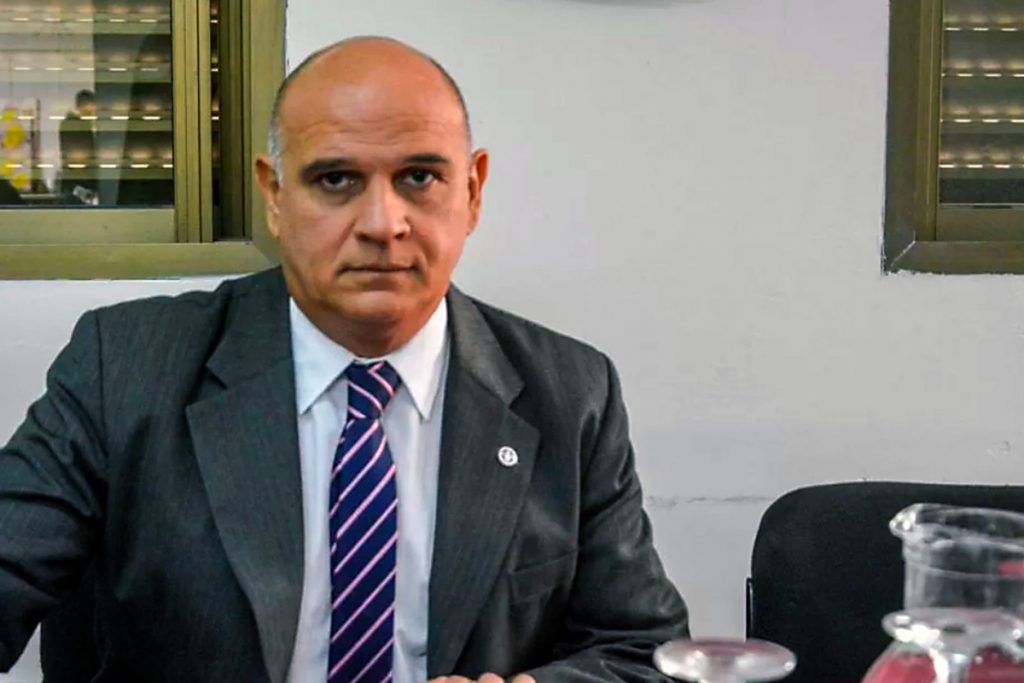El fiscal Carlos Rívolo dictaminó que el presidente Javier Milei no cometió un delito al sostener que “anhelamos que los malvinenses decidan algún día votarnos con los pies a nosotros”. Se trata de la frase que pronunció en su discurso del pasado 2 de abril, en la conmemoración por el Día del Veterano y los caídos en la Guerra de Malvinas. La definición lo inclinó a favor del principio de autodeterminación de los habitantes de las islas ocupadas ilegalmente por Reino Unido.
“Luego de analizar los hechos expuestos en la denuncia objeto de autos, este Ministerio Público habrá de solicitar la desestimación de las presentes actuaciones, por inexistencia de delito”, sostuvo el funcionario en una resolución a la que accedió Tiempo Argentino y que Agenda Malvinas reproduce. Rívolo sostuvo que “no se advierte que de los dichos atribuidos al Presidente de la Nación, Dr. Javier Milei, se verifique la comisión de un delito penal”.

Fiscal Federal Carlos Rívolo
Milei había sido denunciado por el presidente de la Confederación de Combatientes de Malvinas, Ramón Cayetano Robles. Con el patrocinio del abogado Walter Di Giuseppe, le imputaban al presidente la posible comisión de los delitos de violación de los deberes de funcionario público, abuso de autoridad y traición a la Patria. ¿El hecho? Haber sostenido en su discurso que “si de soberanía sobre las Malvinas se trata, nosotros dejamos en claro que el voto más importante de todos es el que se hace por los pies y anhelamos que los malvinenses decidan algún día votarnos con los pies a nosotros”.
Por eso, había dicho Milei, “buscamos ser una potencia, a punto tal que ellos prefieran ser argentinos, que no haga falta usar la disuasión o el convencimiento para lograrlo”.
Tras eso, los denunciantes formalizaron en la Justicia un cuestionamiento que no tardó en aparecer desde muchos sectores, por haber pronunciado una frase contraria a la posición histórica de Argentina y favorable al principio de autodeterminación de los pueblos, que no rige para los malvinenses.
El fiscal pidió que se descarte la denuncia
Para el fiscal eso “de ninguna manera puede considerarse (…) como un abuso de autoridad presidencial y menos aún traición a la patria, pues no se advierte de sus dichos una intención de renunciar a los reclamos de soberanía sobre las Islas Malvinas, Georgias del Sur y Sándwich del Sur establecido en la Constitución Nacional”.
Al adentrarse en su argumentación, el fiscal sostuvo que no están dados en el caso los requisitos que establece el artículo 248 del Código Penal para la imputación de la figura de abuso de autoridad. En el dictamen, el funcionario judicial citó textual el texto de la norma y sostuvo que es lógico que no se incurre automáticamente en el delito por revestir una función pública, sino que se requiere el dictado de órdenes, resoluciones o normas contrarias a la ley. Sobre esa base, Rívolo sostuvo que “se pretende atribuir al Dr. Milei un supuesto “abuso” solamente por sus dichos en el marco de un discurso, pero lo cierto es que, al menos por ahora, esas manifestaciones no se tradujeron en alguna resolución u ordena que pueda llegar a considerarse contraria a la ley”.
En su dictamen, el fiscal también señaló que no hay duda que entre las facultades presidenciales está el trazado de los lineamientos de política exterior y la definición de cuál será su papel en ese contexto. “Desde luego que cada presidente habrá de imprimirle a su administración, de acuerdo a su personalidad, un estilo propio de administración en esta materia, que podrá agradar a unos y disgustar a otros, pero que, en tanto y en cuanto no importe un perjuicio cierto y determinado para los intereses del país, no puede de ninguna manera ser objeto de revisión por parte del Poder Judicial y, mucho menos, de la justicia penal”.
Así las cosas, para Rívolo quedó claro que las manifestaciones del presidente “de ninguna manera pueden ser motivo de persecución penal”. También que del estricto análisis de las palabras pronunciadas en el discurso del pasado 2 de abril en la Plaza San Martín, durante el acto oficial del Día del Veterano y los Caídos en la guerra de Malvinas, “no se aprecia de ninguna manera una intención de renunciar al reclamo sobre las Islas Malvinas, Georgias del Sur y Sándwich del Sur”.
Según el fiscal, por el contrario, “parecería expresar su deseo de fortalecer la posición de nuestro país para, en un futuro, tener mayor éxito en el reclamo de soberanía que nuestro país ha venido sosteniendo -sin éxito- desde antaño”.
Con el pedido de desestimación, el fiscal considera que no hay elementos para avanzar en una causa penal. Ahora, la definición está en manos del juez federal Sebastián Ramos, sorteado por la Cámara para entender en la denuncia.
Fuente:


